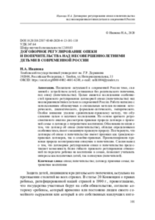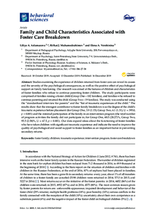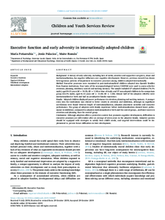Displaying 71 - 80 of 151
The authors of this chapter from Reforming Child Welfare in the Post-Soviet Space introduce the ongoing child welfare reforms in Russia and consider the international and national context, as well as the main drivers of these reforms and their current results.
Целью является исследование особенностей правового регулирования договорной опеки (попечительства) над несовершеннолетними детьми в современной России.
This research was aimed at the features of children and characteristics of foster families who refuse to continue parenting foster children.
To investigate the early language development of children raised in institutional settings in the Russian Federation, the authors of this study compared a group of children in institutional care to their age‐matched peers raised in biological families, who have never been institutionalized using the Russian version of the CDI.
In this study, executive functions were examined in post-institutionalized children adopted into Spanish families from Russian institutions.
This is a study on perceptions of child abuse and interventions in cases of abuse in the Family and Childhood Support Centres in Saint Petersburg, Russia.
Join this webinar to walk through the PROMISE Child Participation Tool and to discuss approaches and considerations for soliciting children’s views on their Barnahus experience.
In this article, institutions in Russia, China, Ghana, and Chile are described with reference to the circumstances that lead to children’s institutionalization, resident children’s social-emotional relationships, and unique characteristics of each country’s institutional care (e.g., volunteer tourism in Ghana, and shifting demographics of institutionalized children in China).
The purpose of this webinar is to shed light on the specific experiences and issues of unaccompanied and separate girls in the European Response.
This paper examines the data of empirical research on child-parent relationship in the Russian adoptive and birth families.



